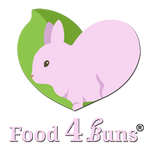Food, not Junk!
First of all, these are the don’t-do’s: treats offered in pet stores! Yogurt drops, alfalfa cookies and all that contain way too much sugar and oat, and make the bunnies sick and obese. Never give them chocolate or yogurt drops. They don’t have the necessary enzymes to break down the lactose.
Grass/Hay
The most natural foods for bunnies are grass and hay. If you’re certain that your lawn is not fertilized and no raccoons visit it in the night, then you may offer your bunnies (after getting them used to it over a couple of weeks) lots of grass.
Because grass usually cannot be offered throughout the year, the alternative is hay. This should be limitlessly offered at all times. Because bunnies have a digestive system that requires them to eat constantly, it is very important to offer them lots of fiber and less calories.
It is still very common in the U.S. to feed your bunnies pellets. No rabbit vet in Europe would recommend that anymore. Bunnies need to wear their teeth off. Pellets do not help with this so there is a vast number of bunnies that need their teeth clipped every couple of months. This can be avoided by not feeding pellets at all!
Remember, there are no pellets in nature.

These are what they love, and they’re healthy:
Fennel, carrots (with the green tops), celery, parsley root, parsnip, cucumber, different kinds of salads, belgian endives, apples, sunchoke, as well as all common herbs: parsley, cilantro, dill and basil.
Carrots are widely considered treats in the U.S., but they’re more than that and full of vitamins. In a pellet-free diet, a daily piece of carrot is absolutely fine.
Bunnies also like kohlrabi (which is rather uncommon in the supermarkets here), chinese cabbage, green cabbage, fresh corn with leaves; broccoli should only be fed in small amounts.
Other vegetables such as onions, avocados and potatoes are not suitable.

Green Veggies
Green veggies should also be fed.
“Green veggies” means all green plants like: Dandelions, Chamomile, Parsley, Dill, Stinging Nettles and Plantain.
Flowers and Herbs
They love flowers such as Sunflowers, Calendulas/Marigolds, and Daisies.
They also enjoy herbs and leaves of carrots, fennel, kohlrabi, as well as strawberry leaves.
Pellets and Compound Feeds
Pregnant, sick, or baby bunnies may receive about a 1/2 teaspoon of pellets per pound, per day.
The important thing to remember is not to buy just some colorful mixture from the pet store. Pellets should NEVER contain oats, wheat, bran, corn, or sugar.
Twigs & Branches
Bunnies should be fed twigs and branches to enable them to wear off their incisors - especially branches from pesticide-free trees: apple trees, hazelnut bushes, pear trees, birch (not too much), alders, willow, currant, and blueberry; some forms of fir can also be fed. But remember: everything must be free of pesticides!
Thuja and yew tree are poisonous!

Water
Fresh water must always be available to the bunnies in a non-dripping bottle or in a heavy bowl (which is actually more natural because they do not have to bend their heads; they will drink much more and be healthier).
Additional vitamins, salt blocks or chalk are not necessary. On the contrary, they can lead to kidney problems.
Bunnies do not do well with sudden changes in their diet. So whatever new food you’re trying, start slowly and in small amounts.
